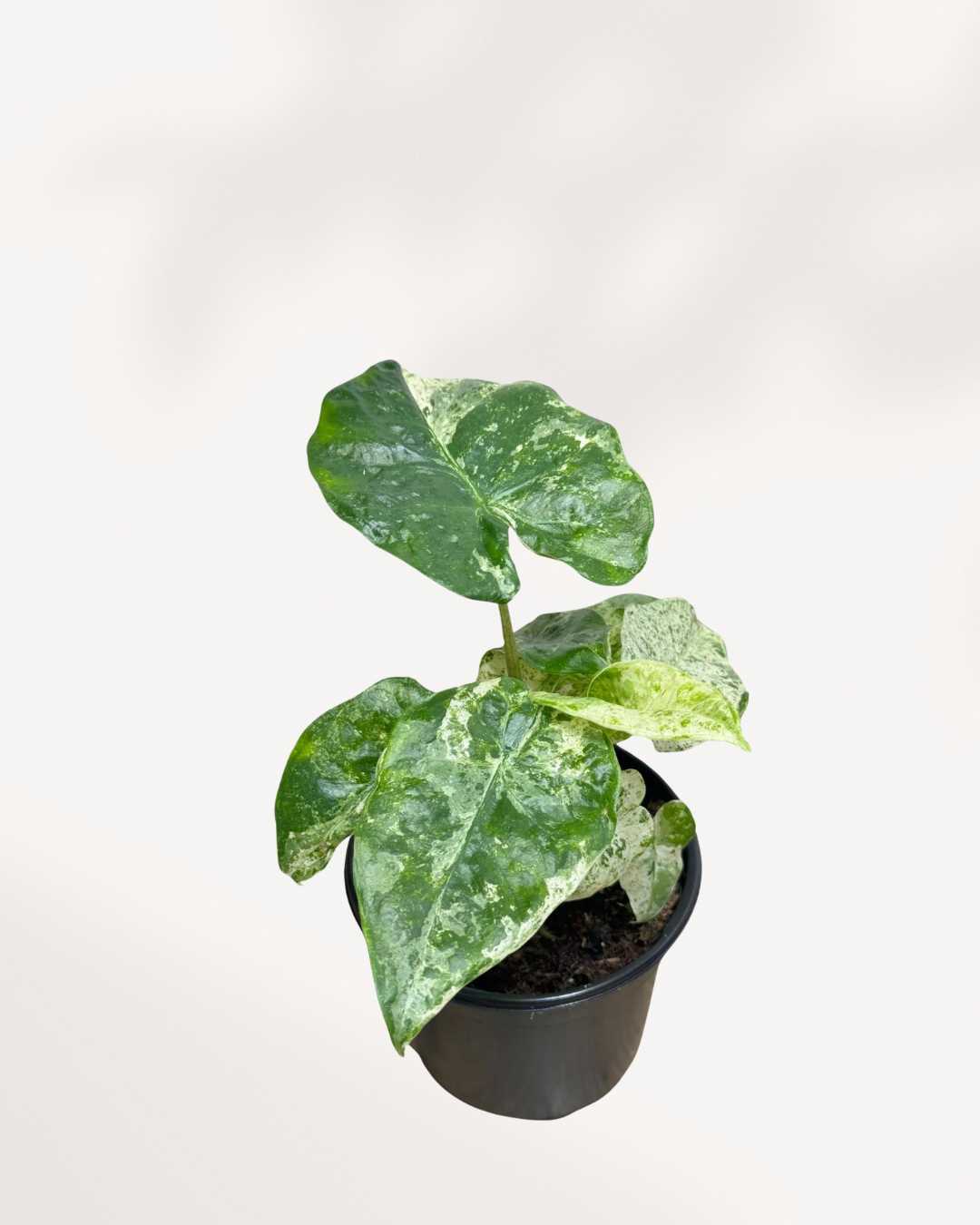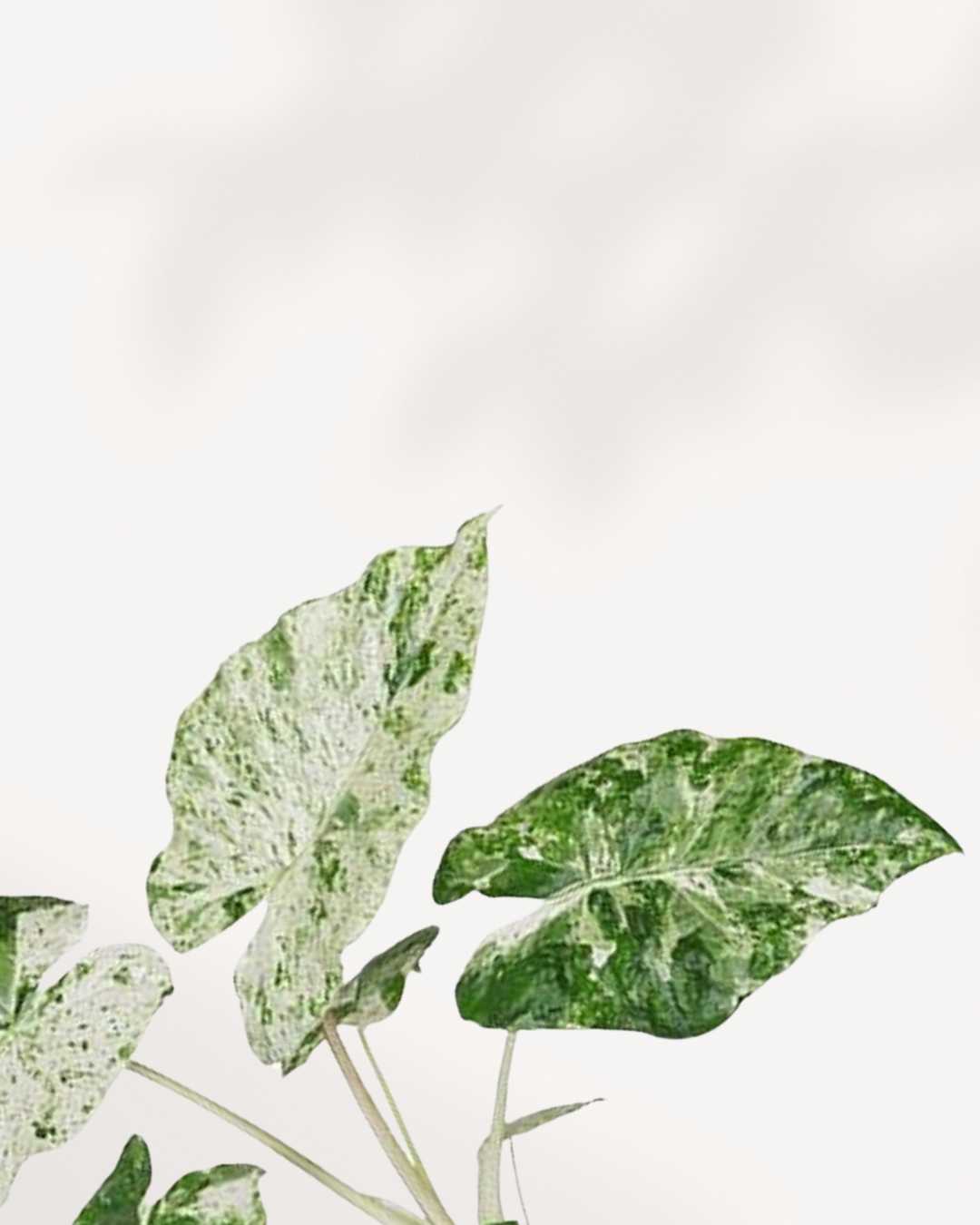Couldn't load pickup availability
Alocasia Macrorrhiza Camouflage Variegata – Exotic Patterned Foliage
The Alocasia Macrorrhiza Camouflage Variegata is a stunning tropical houseplant celebrated for its large, patterned leaves with unique variegation. Its dramatic, textured foliage mimics a camouflage effect, creating a bold statement and adding a natural, jungle-like vibe to any indoor space.
Why You'll Love Alocasia Macrorrhiza Camouflage Variegata
👑 Large, patterned leaves with striking variegation
🌬️ Enhances indoor air quality and adds humidity
🪴 Perfect statement plant for floors, corners, and bright indoor spots
🌿 Thrives with proper care of moisture and filtered light
Order Yours TodayCommon Names
- Alocasia Macrorrhiza Camouflage Variegata
- Camouflage Alocasia
- Variegated Elephant Ear
Botanical Classification
- Kingdom: Plantae
- Order: Alismatales
- Family: Araceae
- Genus: Alocasia
- Species: Alocasia macrorrhiza hybrid
Native Habitat
Originating from tropical Southeast Asia, this Alocasia hybrid thrives in warm, humid environments with filtered light. Its variegated leaves evolved in shaded forest understories, making it well-suited for indoor cultivation under indirect light.
Why It’s So Popular
- Striking, large leaves with unique variegation
- Architectural and sculptural presence indoors
- Adds tropical ambiance and helps clean the air
- Relatively low-maintenance once environment is optimal
Description
Appearance
Alocasia Macrorrhiza Camouflage Variegata showcases oversized leaves with a mix of dark green, light green, and creamy variegated patterns, creating a dramatic camouflage effect. Sturdy stems hold each leaf upright for a sculptural display.
Growth Habit
Grows up to 3–4 feet tall indoors with broad leaves. Ideal for floor placement in bright, filtered light, or grouped with other tropical plants to create a lush corner.
Popular Alocasia Varieties
Alocasia Dragon Scale
- Features textured, scale-like leaves with bold white veins, a dramatic focal point.
Alocasia Black Velvet
- Deep green velvety leaves with bright white veins, perfect for contrast in any space.
Alocasia Frydek
- Arrow-shaped leaves with velvety texture and striking white veining, a classic indoor Alocasia.
Alocasia Regal Shield
- Large, shield-shaped leaves with deep green hues, ideal for dramatic interior design.
Dealing with Pests
Whiteflies
Inspect regularly and remove manually. For tips: Whitefly Prevention.
Aphids
Wipe leaves or use insecticidal soap. More info: Aphid Guide.
Fungus Gnats
Allow soil to dry between watering and use sticky traps. Guide: Fungus Gnat Control.
Thrips
Neem oil or manual removal works. Tips: Thrips Management.
Scale
Remove manually or use horticultural oils. Learn more: Scale Guide.
Spider Mites
Increase humidity and apply insecticidal soap if webs appear. See: Spider Mite Guide.
Mealybugs
Remove with alcohol and repeat as needed. Guide: Mealybug Guide.
Frequently Asked Questions
How much light does Alocasia Macrorrhiza Camouflage Variegata need?
Bright, indirect light is ideal. Avoid direct sunlight to prevent leaf burn.
How often should I water it?
Keep soil evenly moist, allowing the top inch to dry out between waterings.
Is it safe for pets?
No, Alocasia plants are toxic to cats and dogs. Keep out of reach.
Does it prefer high humidity?
Yes, high humidity encourages lush foliage and healthy growth.
Learn More About Alocasia Plant Care
Visit our Alocasia Plant Care Guide for detailed care instructions.
Bring Tropical Drama Indoors
Add Alocasia Macrorrhiza Camouflage Variegata to your collection and enjoy its exotic, patterned foliage every day.
Order Yours NowHow to take care of Alocasia Macrorrhiza Camouflage Variegata
Sun: Indirect
Sun: Indirect
Light: Medium - Bright
Light: Medium - Bright
Water: When half dry
Water: When half dry
Humidity: High
Humidity: High
Pet Friendly: Caution
Pet Friendly: Caution
Pro Tip
Pro Tip
Delivery Policy for Plant Condition
Delivery Policy for Plant Condition
"I have only received part of my order. What to do?
No worries if you've only got part of your order! Our plants come from different nurseries and might arrive in separate shipments, typically 1-2 days apart. It's all part of ensuring your green friends reach you in top-notch condition!
If you do not receive the remaining packages within 48 hours contact support at info@mygreenscape.ca
What is the Life Time Support?
Absolutely! Lifetime support means you can count on us whenever you have questions or uncertainties about your plant. Whether you're puzzled by its behavior or just want to ensure it's thriving, we're here for you. Connect with us on Instagram @mygreenscapeto or shoot us an email at support@mygreenscape.ca.
When it comes to our guarantee for plants shipped with standard or express, rest assured that we offer a 30-day happy healthy plant guarantee on all such shipments. This ensures that your plants are covered for 30 days after delivery, giving you peace of mind regarding their condition. If you have any concerns within this period, feel free to reach out to us for assistance.
For further details, please visit our Local Delivery, Store Pickup, Standard Shipping Guide Page.
What to expect
What to expect
Your plant will arrive in a standard nursery pot, typically 0.5" - 1" smaller than the stated size to seamlessly fit into your chosen decorative pot. Washable Paper Planter Bags are available for separate purchase.
Just like nature intended, each plant is unique, showcasing natural variations in size, shape, and characteristics. Our commitment is to deliver a plant that closely resembles the one featured on our website, matching your chosen size, and with the potential to thrive happily in your home.
Frequently Asked Questions
Frequently Asked Questions
Certainly! If you're pondering about ordering plants online, you're not alone. We've compiled the most frequently asked questions. Check out our FAQ section here for quick answers! Happy planting!
Plant & Pot Size Chart
Plant & Pot Size Chart
Choosing the right pot size for your plants can be a daunting task, especially if you're new to gardening. But fear not! Our pot sizes chart can help you find the perfect match for your plants, ensuring they have enough space to grow and thrive. With our guide, you'll be able to confidently choose the right pot size and plant variety for your gardening needs.
Plant Pot Size Guide.

| Extra Small | 7-10 cm | 2.5 - 3 inches |
| Small | 11-12 cm | 3.5 - 4 inches |
| Medium | 14-17 cm | 5 - 6 inches |
| Large | 19-21 cm | 8 - 10 inches |
| Extra Large | 24-27 cm | 12 - 14 inches |
All sizes are specified in product details.
Your Complete Guide to Pot Sizes: What Size Should You Choose?

When selecting a pot for your plant, it's important to find the right size. But with all the different options out there, how do you know which one is best? We're here to help!
MyGreenscape's pot sizes chart is a great resource for finding your perfect fit. Our easy-to-read chart takes out all the guesswork and helps you quickly choose the right size for your plant.
Smaller pots are best for seedlings or small plants just starting out. These tend to be shallow but wide, allowing enough room for the roots of the young plant but not too much where they get overcrowded. Medium-sized pots are ideal when your plant has grown from its infancy and is ready for more space. These are deeper and wider than small pots, so that it can accommodate larger root systems - making sure your plant gets enough nourishment while still giving it breathing room. Large pots are top choice if you have an established plant in need of lots of space - think trees and large shrubs! The spacious depth and width allow plenty of room for deep root systems without struggling for air or light.
No matter what size you choose, MyGreenscape has got you covered, with our pot sizes chart guaranteeing you find the perfect fit every time!
Winter Shipping Protection
Winter Shipping Protection
We take extra care with each package during the colder months. For destinations experiencing cold weather, we provide insulated packaging and heat packs as needed to protect your plants from freezing temperatures. With Winter Shipping Protection, your plants are equipped to arrive safe and sound, even in winter’s chill.
Care Guide
Care Guide
Explore essential care tips. check out our Comprehensive Resource for Indoor Plant Care.


WATERING MADE EASY
Check soil moisture before watering and use a potting mix that drains well. It’s the secret to healthy, happy plants!
Hear From Happy Plant Parents.
Who have brought Mygreenscape plants into their homes.





